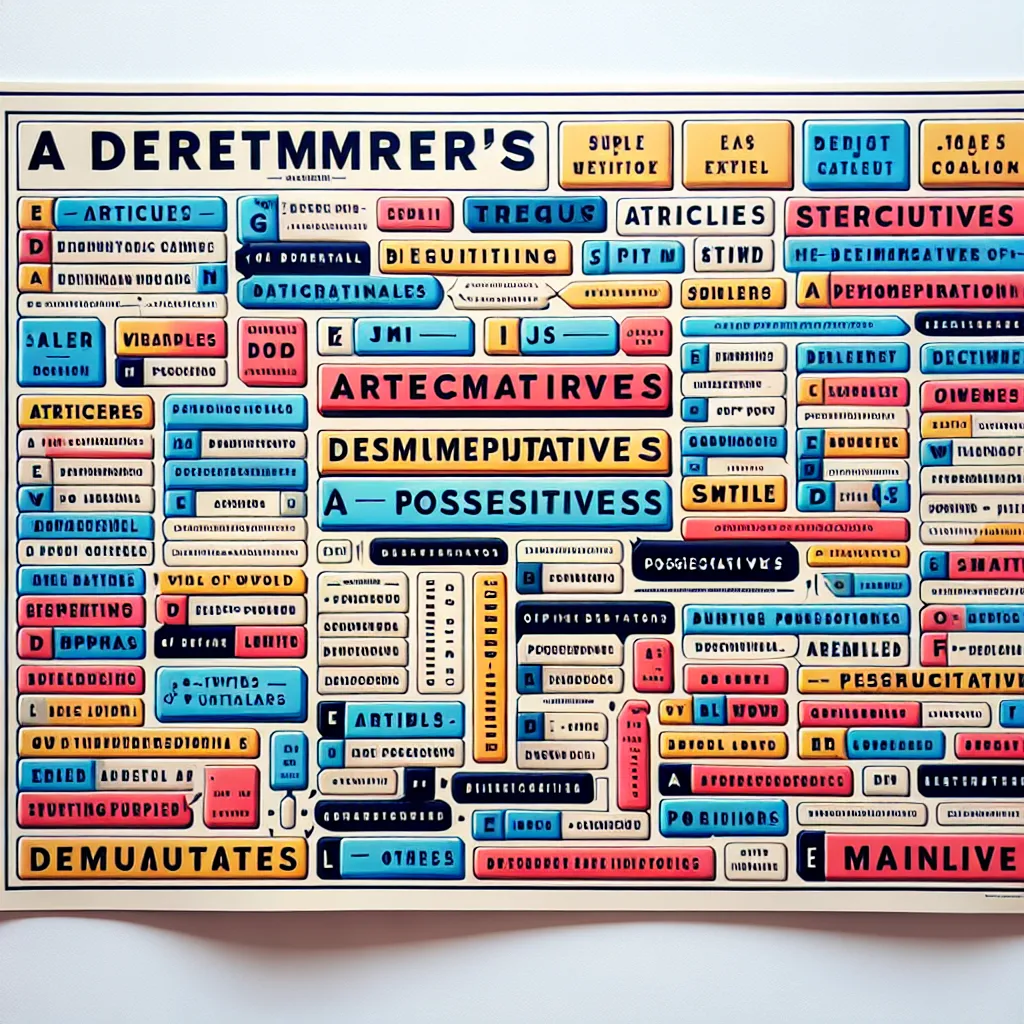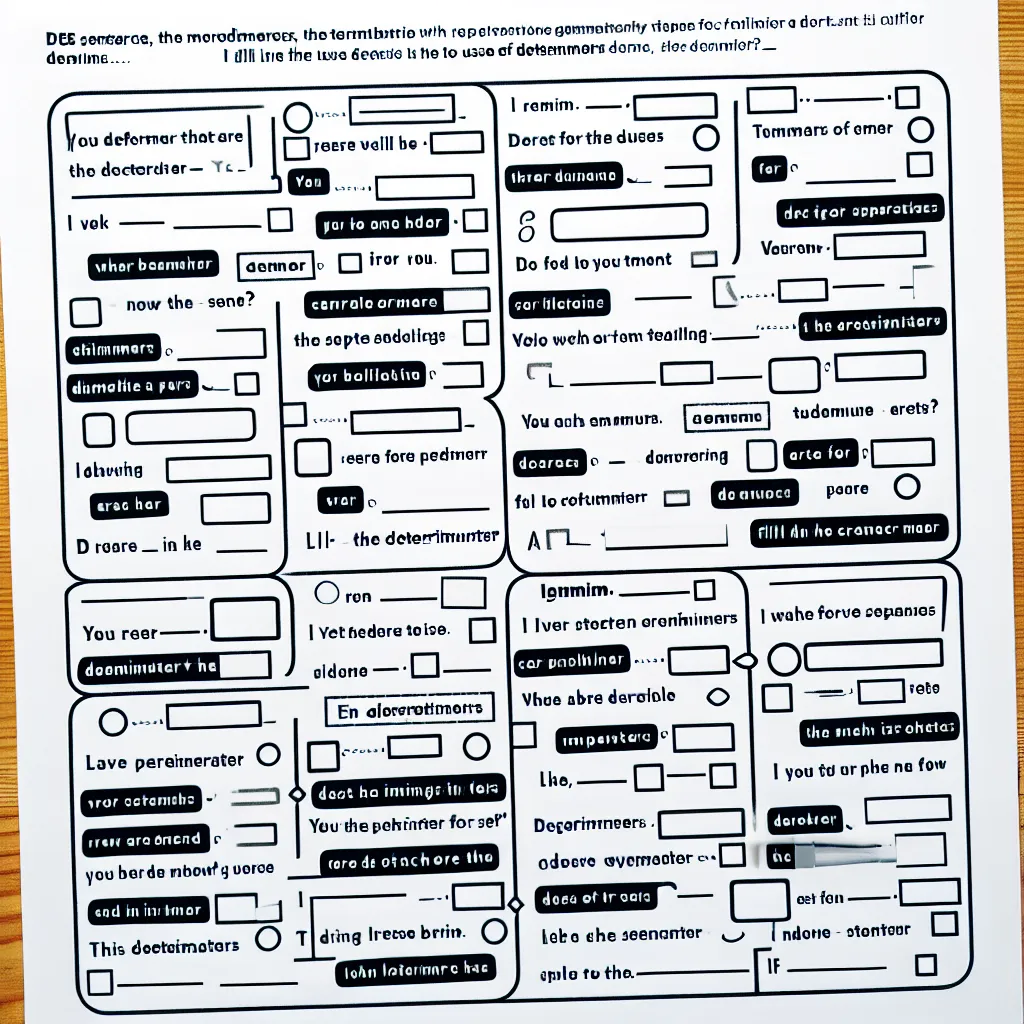Mastering the use of determiners is a crucial aspect of English grammar that can significantly enhance your language proficiency. Whether you’re preparing for the IELTS exam or simply aiming to improve your English skills, understanding and correctly using determiners is essential. This guide will provide you with valuable insights, practical tips, and examples to help you perfect your use of determiners.
 English Determiners Chart
English Determiners Chart
What Are Determiners and Why Are They Important?
Determiners are words that come before nouns to specify or “determine” what the noun refers to. They play a vital role in providing context and precision to our communication. Proper use of determiners can make the difference between vague statements and clear, specific expressions.
Types of Determiners
- Articles (a, an, the)
- Demonstratives (this, that, these, those)
- Possessives (my, your, his, her, its, our, their)
- Quantifiers (some, any, many, few, several)
- Numbers (one, two, first, second)
- Distributives (each, every, either, neither)
The Importance of Determiners in English
Determiners are essential for:
- Providing specificity: They help identify particular items or groups.
- Indicating possession: They show ownership or association.
- Expressing quantity: They convey amounts or numbers.
- Enhancing clarity: They reduce ambiguity in communication.
Common Challenges in Using Determiners
Many English learners struggle with determiners due to several factors:
- Absence in native language: Some languages don’t use determiners, making it challenging for speakers to grasp their importance in English.
- Complex rules: The rules governing determiner usage can be intricate and sometimes inconsistent.
- Contextual usage: The correct choice of determiner often depends on the context, which can be confusing for learners.
Strategies for Mastering Determiners
1. Understand the Basic Rules
Start by learning the fundamental rules for each type of determiner:
- Articles: Use “a” before consonant sounds, “an” before vowel sounds, and “the” for specific items.
- Demonstratives: Use “this” and “these” for nearby items, “that” and “those” for distant items.
- Possessives: Match the possessive determiner with the possessor, not the possessed item.
2. Practice with Contextual Examples
Expose yourself to various contexts where determiners are used:
- Read extensively: Novels, newspapers, and academic texts provide diverse examples of determiner usage.
- Listen actively: Pay attention to how native speakers use determiners in conversations, podcasts, or TV shows.
3. Use Mnemonic Devices
Create memory aids to remember tricky rules:
- “A” is for Apple (consonant sound), “An” is for Orange (vowel sound).
- “The” is for “The One and Only” (specific items).
4. Engage in Regular Writing Exercises
Practice writing sentences and paragraphs focusing on correct determiner usage:
- Keep a journal and consciously use a variety of determiners.
- Participate in online writing forums or language exchange platforms.
 Determiner Exercise Worksheet
Determiner Exercise Worksheet
5. Seek Feedback and Correction
Regularly have your writing checked by native speakers or qualified teachers:
- Join language exchange programs or online tutoring services.
- Use grammar checking tools, but always verify their suggestions with reliable sources.
Common Mistakes to Avoid
-
Overusing “the”: Not every noun needs “the” before it.
Incorrect: I love the dogs.
Correct: I love dogs. (when talking about dogs in general) -
Misusing “a” and “an”: Remember, it’s the sound, not the spelling that matters.
Incorrect: I saw an unicorn.
Correct: I saw a unicorn. -
Forgetting determiners: Some learners omit determiners where they’re needed.
Incorrect: I bought book yesterday.
Correct: I bought a book yesterday. -
Using determiners with uncountable nouns: Some determiners don’t work with uncountable nouns.
Incorrect: I need a water.
Correct: I need some water.
Advanced Tips for Perfecting Determiner Usage
-
Study collocations: Learn which determiners commonly appear with specific nouns or in certain phrases.
Example: “On the other hand” (not “on other hand”) -
Understand the nuances: Recognize how changing the determiner can alter the meaning of a sentence.
Example: “A solution” vs. “The solution” -
Practice with authentic materials: Use real-world texts to see determiners in context.
Suggestion: Analyze news articles or academic papers in your field of interest. -
Create your own examples: For each new rule you learn, write several sentences applying that rule.
-
Use technology: Utilize language learning apps that focus on grammar, particularly determiners.
Conclusion
Perfecting The Use Of Determiners is a journey that requires patience, practice, and persistence. By understanding the basic rules, engaging in regular practice, and being mindful of common pitfalls, you can significantly improve your mastery of this essential aspect of English grammar. Remember, like any language skill, proficiency with determiners comes with time and consistent effort. Keep practicing, stay curious about the language, and don’t hesitate to seek help when needed. Your improved command of determiners will not only boost your IELTS scores but also enhance your overall English communication skills.




